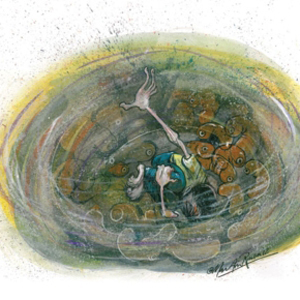This is a reader response to our recent interview with the moral philosopher Peter Singer (“The gap between rich and poor isn’t just about the billionaires”, spring 2016). A version of this response appears in the Witness section of the Summer 2016 New Humanist.
Religion and poverty fit together like a shirt and tie. Yet Peter Singer wants to make common cause with religious actors and use the Gospels as evidence of obligations to the poor. It is no longer fashionable to quote Marx on religion, even to Marxists or socialists. “The criticism of religion is the prerequisite of all criticism,” he wrote. This is not something that they wish to dwell on. But here, perhaps more than anywhere else, Marx’s words have resonance today.
Religion remains so often the opium of the people and, like any dangerous substance, has the tendency to leave its dealers and wholesalers well off and its users impoverished. From the entrepreneurial televangelists of the United States to the gold Breguet watch of Patriarch Kirill of the Russian Orthodox Church, religion sells, while offering the poor salvation. Eventually. The wealth of great corporate institutions such as the Church of England or that of Rome always seems to endure. Their ability to convince others of a concern for the poorest while holding on to obscene amounts of wealth in land, art, cash and property is a feat that no political party or class has ever been able to sustain. In the UK, through tax exemption status and initiatives such as Gift Aid, the taxpayer, rich or poor, subsidises religious organisations.
That is not religion’s worst crime. Internationally, many of the world’s “great” religions are characterised by gender relations that deny women control over their own bodies, especially in terms of whether to have children and, if so, how many. In treating half of the population in this way, the potential of so many women and girls is restricted and unfulfilled. That is one of the tragedies of our time. Many of the problems Singer expresses concern about – poverty, the existence of vast numbers of refugees and environmental crises – are exacerbated by a staggering demographic bulge. Addressing these problems will involve empowering women, something that requires less organised religion.
In the West, the women’s liberation movement, technological advances in terms of contraception and a decline in religiosity in the later 20th century chipped away at the unequal status that religion inflicts on women. Yet there are few grounds for complacency. We certainly need to see further research in the UK regarding the extent to which Muslim women’s lower levels of economic participation can be explained in terms of racism, social exclusion, or the reproduction of the religious practices and attitudes that ensure the pitiful levels of female employment in Muslim-majority countries such as Egypt or Pakistan.
In Britain, it is possible that all of these factors are at play. A recent book by the BBC religious affairs journalist Innes Bowen, Medina in Birmingham, Najaf in Brent, revealed staggering restrictions imposed on some Deobandi Muslim women, such as discouragement from leaving the home and restrictions on travelling, except with a male relative.
Marx wanted man to discard his illusions and to fashion his own reality. However wrong he has been proven elsewhere, that seems a pretty good place to start with regards to our personal lives. It is certainly more logical than Peter Singer’s approach.

